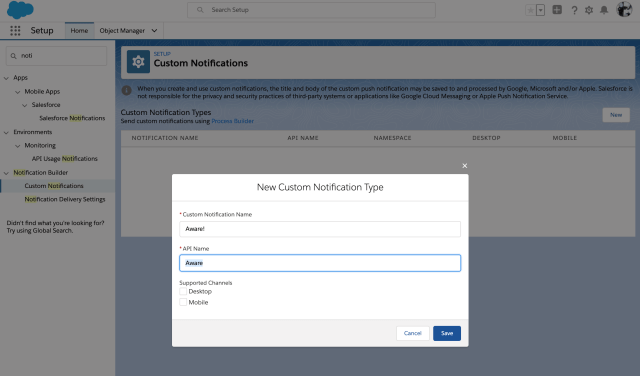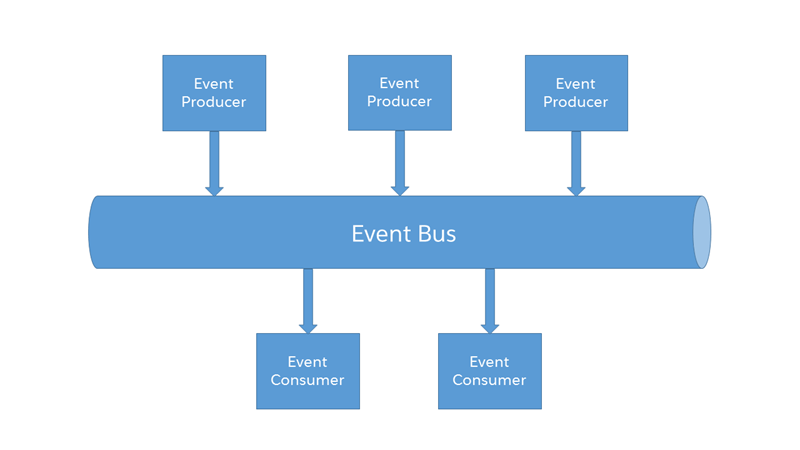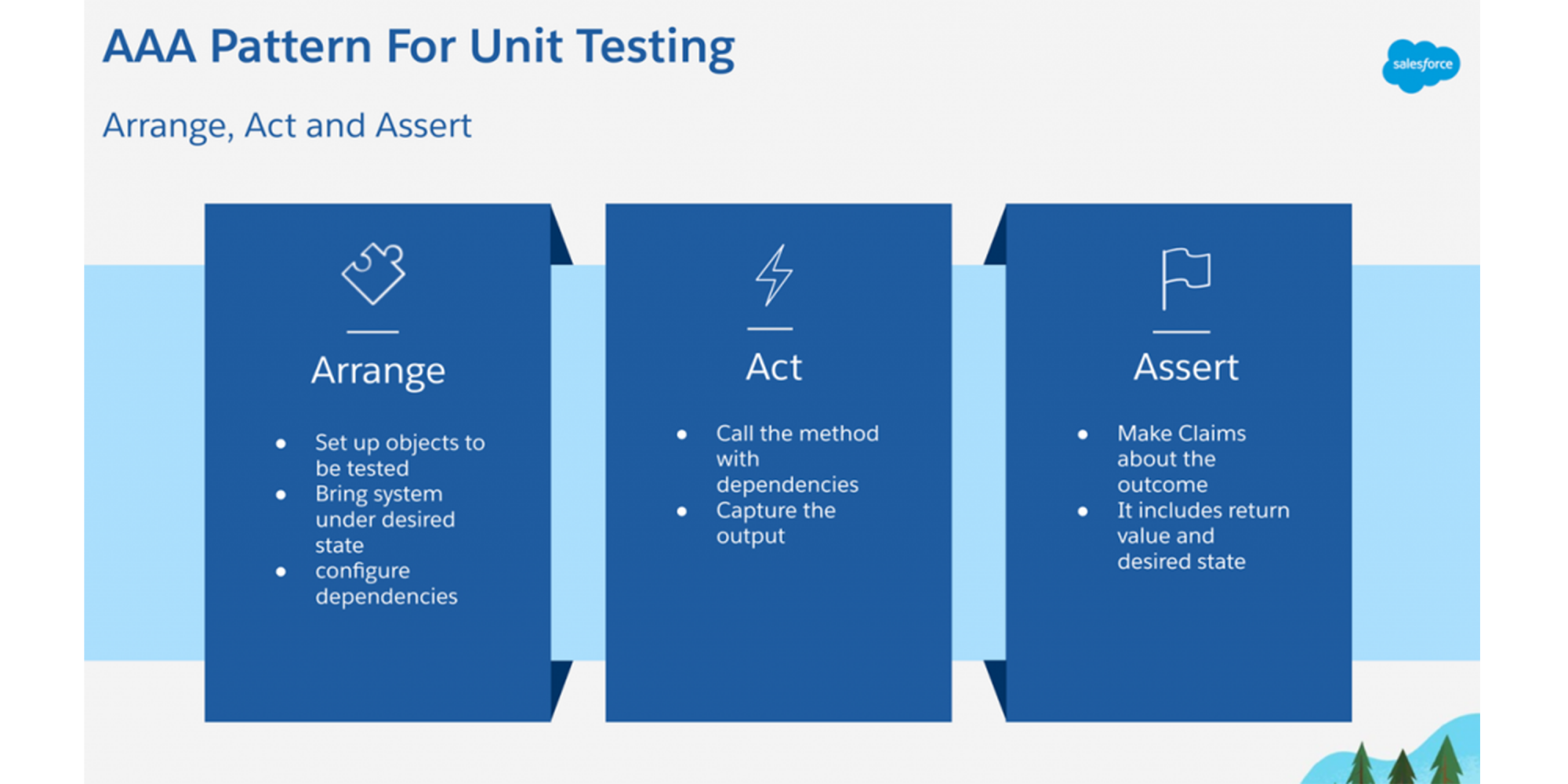P. ¿Diferencia entre Bulk Api Vs Data Loader? Dataloader es bueno para insertar hasta 5 millones de registros. La API masiva le permite ejecutar las inserciones en el cargador de datos de forma asincrónica. Utilizando … Leer más »
Seguir leyendo🔔 ¿Creador de notificaciones de Salesforce?
¿Sabía que puede utilizar Salesforce Notification Builder para crear notificaciones personalizadas para equipos, colas de tareas y grupos públicos? ¡O incluso para reemplazar las notificaciones estándar o desactivar lo que no es necesario! Honestamente, las notificaciones personalizadas es algo con lo que no he jugado mucho, admito que casi me pierdo la función por completo. Puede activar Leer más sobre 🔔 Generador de notificaciones de Salesforce? […]
Seguir leyendoHiring your next Salesforce Rockstar [Step by Step]
Two points of housekeeping before I kick this blog post off.
- Sorry, it has been so long since I’ve last blogged. I have several excuses lined up and none of them really measure up to my personal commitment to this blog and that’s on me to fix.
- The below blog is my personal experience over the last few years of hiring Salesforce professionals and certainly isn’t an exhaustive list. Use this as one of several points of research.
I hate the term Rockstar. Its overused and I’m part of the problem. Rockstar implies that you are the best in your area of expertise, among the entire Salesforce ecosystem. I mean, come on, if everyone is a Rockstar then no one is. By definition, yes, there is A Rockstar out there. There has to be someone that is, indeed, “the best”. But you don’t need that person and here’s why:
- They are super expensive and would only produce marginally better products than, let’s say, the Rockstar Understudy
- Note the title of this blog is “Your Rockstar” not “A Rockstar” – Talent should be tailored as much as possible to your specific company and situation.
So, James, you ask with smitten how do I find “My Rockstar” then?
First, we must talk about Defining Your Need. I’ve made several mistakes over the years which have honed my skill set in defining what type of talent is needed.
Most Frequent Task
In this category, you define what you’ll be doing most frequently and then building a list of tasks that are likely to be the day-to-day tasks done most of the time. Then, match these tasks with skill sets needed. Are you writing and/or reviewing Apex code? Then you need development skill sets. Reviewing business requirements and generating customer stories? You need more business Analyst skills then. Here’s an actual example exercise I went through for one of our technical roles. This helped me realize that I didn’t need a Salesforce Admin skill set but rather more of a Developer/Business Analyst skill set.

Soft Skills
I can’t say enough about soft skills. I’ll expand this out to ancillary skills as well. Soft skills are skills that are hard to define with things like coding tests and certifications. Being able to work well within teams and communicate clearly to customers and internal resources are almost always needed. But there are several soft skills which you know you need and should always test. Often times these are honed from professional experience.
I’ll expand on ancillary skill sets for a moment. You may be an in a situation where you can’t find everything you want in candidates or are priced out of that kind of candidates. In that situation, you can look at ancillary skill sets to round out your skill set requirements. For example, if you need Apex/Visualforce experience but found a good candidate with Salesforce Admin experience and some JavaScript and HTML experience but no Apex/Visualforce experience. You can take a risk and this candidate and leverage Trailhead to help them learn the Salesforce side of things. If candidates have coding experience in similar languages or even Admin experience in similar CRM’s then learning the Salesforce side of things is exponentially easier.
Gut Check
There’s really no replacement for your gut feeling on candidates. Will they fit in with your company culture? Are they committed to your companies mission? Are they looking for the type of role you’re looking for or are they settling? These are important questions you need to ask yourself and be honest about your responses. In the end, its better for you and better for the candidate to be open and honest up front.
In part 1 I discussed how to define out your specific needs and to look for “My Rockstar” instead of just “A Rockstar”. This point is important to consider in our second part. The term Junior or Associate gets a bad wrap these days. I’ll admit, I’m a little bias myself when I see it. We think it means “No Experience”, “Average Performance”, “Not worth my time”, etc. This may not always be the case but I think everyone has run into this “junior” wall before.
If you’re reading this post you’re likely looking at hiring your first Salesforce Professional and that can be scary if you’ve never done it before or not sure what to look for. I’ll send you down two paths:
IF this is your first Salesforce hire then my suggestion is to hire someone with a bit of experience under their belt. Even a few years of working experience in the Salesforce ecosystem gives people a skill set that can’t be replicated in school or in other roles. For example, Admins with experience often know how to determine the right way to do something as opposed to the way you know how to do it. On the other end, you are likely to be inexperienced in working with an Admin and thus the relationship may not blossom as much as you hope.
There are some other options if you have never hired a Salesforce Admin before that will help you determine what you need and help define the skill sets you are likely to need in a resource.
Contracting:
There are several options to hire short and long term contractors on full-time, part-time, or even by project or ad-hoc basis. For example, Upwork.com has a large collection of Salesforce experts at a wide range of price ranges and expert levels.
Salesforce Partners and Consulting shops are also a good way to hire an Admin-As-A-Service type role.
Finally, link up with your local area’s User Group and ask for help. The User Group leader for your area usually has their finger on the pulse of who’s available and you get the bonus of getting a local person. Likewise, area businesses are almost always willing to share contacts of people they have worked with in the past.
IF you have hired some Salesforce professionals before and are familiar with your requirements for the position I implore you to think creatively and go “Junior”. As I mentioned before, this doesn’t have to be someone that is in-fact Junior but might be someone that doesn’t have a strict Salesforce background but has complimentary skill sets that enhance their value.
I’ll give you an example. I recently hired a Full-Stack Engineer out of a coding boot camp who was a career shifter from the banking industry. Their background is in ReactJS and they did several projects with this language in the coding boot camp they graduated from. I recently had a project handed to me to investigate Twilio Flex and the integration into Salesforce that integrates a softphone into Salesforce Service Cloud. Surprise, the front end of the softphone can be customized using… you guessed it, ReactJS.
You can learn Salesforce if you have a strong technical background. Salesforce Trailhead makes that easy. But its a little more difficult to go the other way and take a pure Salesforce Admin and teach them complimentary skill sets you might need. Exploring options in hiring “Junior” help to tackle this sort of need and gives you the freedom to train and mold a candidate.
Preguntas de la entrevista en profundidad basadas en escenarios sobre la integración de Salesforce
Generalmente, dominar los conceptos de integración resulta complicado para muchos desarrolladores de Salesforce. Este artículo cubrirá todas las preguntas de la entrevista sobre conceptos de integración de salesforce como Salesforce Connect, Streaming API, SOAP API, … Leer más »
Seguir leyendo12 Essential Admin Tools from Salesforce Labs
Esta es una traducción que desde EGA Futura ofrecemos como cortesía a toda la Ohana y comunidad de programadores, consultores, administradores y arquitectos de Salesforce para toda Iberoamérica. El enlace a la publicación original, lo encontrarás al final de este artículo.
Seguir leyendoEste desarrollador de Salesforce está creando aplicaciones gratuitas para ayudar a los futuros desarrolladores
Esta es una traducción que desde EGA Futura ofrecemos como cortesía a toda la Ohana y comunidad de programadores, consultores, administradores y arquitectos de Salesforce para toda Iberoamérica. El enlace a la publicación original, lo encontrarás al final de este artículo. … Durante los últimos nueve años, Paul Liu ha estado creando aplicaciones los fines […]
Seguir leyendoOpen Sourcing Salesforce CLI Update Feb. 2021
Mejore sus habilidades como desarrollador con la serie de vídeos de desarrollo de aplicaciones modernas
Las aplicaciones modernas requieren adoptar una combinación de low-code y pro-code. Los desarrolladores de Salesforce tienen la difícil tarea de ofrecer soluciones escalables más rápido que nunca, ya que las organizaciones buscan acelerar su transformación digital. En diciembre de 2020, publicamos una entrada en el blog que explica varios patrones que combinan low-code y pro-code. Estos patrones demuestran que al combinar el […]
de Heroku
El post Actualice sus conocimientos de desarrollador con la serie de vídeos de desarrollo de aplicaciones modernas apareció primero en Blog de desarrolladores de Salesforce.
Seguir leyendo




